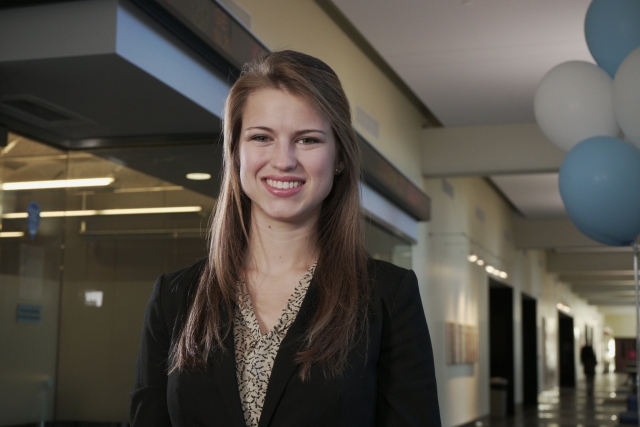“I now understand how to work with different people and look at life from a perspective outside of my own,” shares the University of Texas grad. “That experience was invaluable to my leadership style and perspective on business. Not many people get to step outside of their comfort zone and really learn about a different group of people. In my opinion, requiring a culture and business course would prepare students to be empathetic leaders.”
This preparation might also include developing proficiency with a foreign language, adds Georgetown University’s Michael John Poorten. That was a requirement for international business majors at his school – and one that was second nature for his classmates. “Everyone arrives at Georgetown with some foreign language background from high school, so I think it is reasonable to require all business students to reach a level of proficiency by graduation in either that language or another,” he contends. “It will only give us an advantage in the business world, not to mention it is commonplace in many universities around the globe.”
TEACHING BUSINESS MAJORS SCIENCE…AND LIBERAL ARTS MAJORS BUSINESS
By trumpeting areas like analytics, coding, and foreign language, the Class of 2018 is moving business education towards a more interdisciplinary end. It is an approach, says Northeastern University’s Kate Murdock, that bridges creative thinking and strategy to augment students’ skills in areas like presentation and project management. At the same time, it integrates scientific, technical and engineering skills to produce more well-rounded students. To develop this flexibility, says the University of Washington’s Kate Jung, business majors must be ready to step out of the business school.
This pipeline could also work both ways, adds the University of North Carolina’s Caroline Ririe, with business informing other disciplines as well. “I would create an intro to business course for the liberal arts and sciences majors not looking to major or minor in business. It would include general knowledge regarding the business functions and introduction to personal finance and Microsoft Office. Because the business major and minor is exclusive, I think it is important to offer a readily available class to the rest of the student body.”
SHOULD STUDENTS TEST DRIVE A CLASS BEFORE COMMITTING TO IT?
When it came to the classroom, the Best & Brightest suggested more than just new classes or majors. Stephanie Castro, for example, would eliminate starting classes before 10 a.m. – particularly during the winter when morning temperatures are usually below freezing at the University of Massachusetts-Amherst. More realistically, Michelle Enkerlin advocates that business schools allow students to ‘test drive’ courses before they enroll.
“I would open up every class like an open house for students to sit and listen to a topic they are interested in, but have not taken because of credit requirements, financial constraints, fear of venturing out, etc. I believe the worst thing students can do during college is write-off a topic or class without trying it first.”
Enkerlin wasn’t alone in wanting to experiment. Brian Zuelch, an operations and information management major at the University of Massachusetts-Amherst, recommends a student-led lecture series – one where students would gain public speaking experience while also learning from their peers. As dean, Georgia Tech’s Evie Owens, a prized catch of Home Depot, would hold mandatory career exploration day each semester in place of class.
“Students would take field trips to corporate headquarters,” she envisions. “Students would sign up in advance and the companies would provide tours and background about their industry and their business. It would be a great way for students to meet contacts in companies that they are interested in, as well as learn hands on outside the classroom to be able to apply the business concepts learned practically.”
B-SCHOOL GOES TO THE DOGS…IN A GOOD WAY!
The Class of 2018 also came up with some unexpected ideas that could big returns for the business majors who follow. Using the Delta Club Lounge as a model, J. Scott Allen, III proposes a student lounge that’s only available to Michigan State students who’ve been admitted to the Broad College of Business. The lounge would not only reward business majors for paying their dues, but would also serve as a place to refuel and build community. “I think it would be a point of pride for our business students and a place where we could gather outside of the classroom,” he explains. “That lounge could be a catalyst for the students uniting together.”
A lounge wouldn’t be the only place where business majors could rejuvenate themselves. Considering the non-stop pressure that business majors face, it also helps to find a spot that reminds them of life’s great joys and comforts. That’s why Collin Newton, if he were Bowling Green State’s business dean, would forge a partnership with the local Humane Society.
“The goals of this partnership would be to further integrate the business school into the community, increase the amount of interactions the humane society animals receive, and decrease student stress,” he outlines. “I envision this change manifesting itself in a “play area” in the center of the school where students can interact with animals at their leisure. This mutually beneficial partnership would provide emotional support to both students and animals.”
MENTORSHIP STRIKES A CHORD
When the Best & Brightest were asked to play business school dean, many gravitated towards fostering mentorships. Some graduates, such as Babson College’s Cassiano dos Santos and Santa Clara University’s Katherine Uhl would pair a first year with an upperclassman. This way, freshmen or sophomores would have a go-to person for tutoring or advice (not to mention tap into their mentors’ networks. At the same time, the mentors reap the rewards of paying forward the same benefits they enjoyed.
These mentor relationships wouldn’t just be confined to the undergrad business school either, adds the University of Georgia’s Amir Bouhafs. “I would encourage more interaction between undergrad and MBA students with the goal of the MBA students serving as mentors. The MBA students will benefit from being a role model and learning how to guide someone’s development. The undergrads will benefit from having someone they can always reach out to with questions.”
DON’T MISS:
The Best & Brightest Business Majors – Class of 2018














Questions about this article? Email us or leave a comment below.